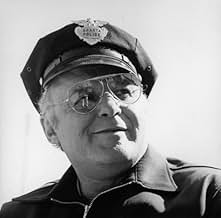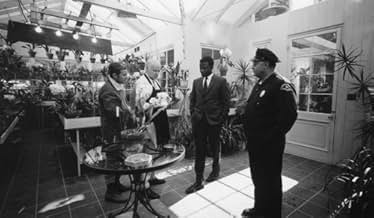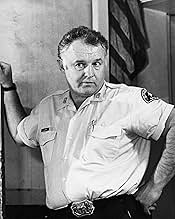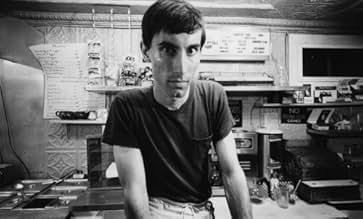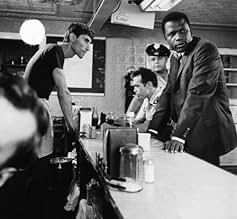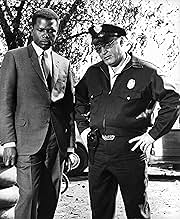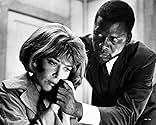A black Philadelphia police detective is mistakenly suspected of a local murder while passing through a racially hostile Mississippi town, and after being cleared is reluctantly asked by the... Read allA black Philadelphia police detective is mistakenly suspected of a local murder while passing through a racially hostile Mississippi town, and after being cleared is reluctantly asked by the police chief to investigate the case.A black Philadelphia police detective is mistakenly suspected of a local murder while passing through a racially hostile Mississippi town, and after being cleared is reluctantly asked by the police chief to investigate the case.
- Won 5 Oscars
- 23 wins & 16 nominations total
- McNeil
- (as William C. Watson)
- Director
- Writers
- All cast & crew
- Production, box office & more at IMDbPro
Featured reviews
Once timely, now timeless
As sheriff Bill Gillespie, Rod Steiger is superb in his Oscar winning role, and this film provides Sidney Poitier with some of his greatest screen moments, including his famous admonition to Steiger that became the title of the less impressive 1970 spin off: "They call me MISTER Tibbs!"
This is one of the few politically correct films to make its point without resorting to heavy-handed, sanctimonious preaching. Stirling Silliphant's Oscar winning screenplay never hits a false note, and the change that occurs in the relationship between the leading characters is subtle, and, therefore, believable. The two stars are ably supported by an outstanding cast of both veterans (Lee Grant, Warren Oates, Beah Richards) and newcomers (Scott Wilson, Quentin Dean, and the delightfully creepy Anthony James). The score by Quincy Jones, featuring Ray Charles' rendition of the title song, captures the proper mood throughout.
In a year when the odds-makers were predicting an Oscar victory for "Bonnie and Clyde" or "The Graduate," "In the Heat of the Night" surprised the prognosticators by taking the Best Picture prize and four other Oscars. Considering its theme of racial tolerance, it seemed an appropriate choice at an Oscar ceremony that was postponed following the assassination of Martin Luther King, Jr. The film's theme made it timely, but its artistry makes it timeless.
The Academy made the right choice.
Brian W. Fairbanks
The Growing Pains of the New South
Especially the Voting Rights Act. The town of Sparta, Mississippi where William Schallert was Mayor and Rod Steiger was sheriff now has a significant new voting population and blacks might be a majority in that county. But even if they aren't, they know have a voice in the electoral process. Someone like Steiger has to take that into account now. Of course some of his deputies might not yet be with the program which explains why when a murder/robbery is committed of a very prominent northern businessman, Warren Oates sees fit to roust Sidney Poitier who's an unfamiliar black face in that town.
What a surprise they all get when they find out he's a top Philadelphia, Pennsylvania homicide detective and when his identity is established, his boss in Philly offers his services.
Poitier and Steiger both have to work through their prejudices, how each sees the other to solve this mystery which writer Stirling Silliphant gives us several red herrings before we learn the truth. Though Steiger got the Oscar for Best Actor, it should really have been a joint award. Their conflict and growing respect for each other drives the film. Steiger needs his expertise and respects him for that and Poitier comes to respect Steiger for his honesty.
Norman Jewison got great performances from his stars and the supporting cast of whom Warren Oates as the dimwit redneck deputy really shines.
Though set in a very narrow period of our history, In the Heat of the Night holds up very well with some eternal truths in its story. And it's the story of times that were a changing as one spokesman of the sixties put it.
Genuinely Shocking but no Surprise...
"They call me Mister Tibbs!"
For Poitier, this film, along with "Guess Who's Coming To Dinner?", marks the last of his civil rights driven roles in which his character's race is an all important plot element. From "Edge of the City" to "The Defiant Ones", Poitier excelled in bringing intelligent and commanding three dimensional characters to life. A feat he had to succeed at if his films were to gain the trust of a predominantly white audience and push for racial equality. Call him the Jackie Robinson of Hollywood.
When we first see Poitier as Virgil Tibbs, he is stepping off the train in the small Mississippi town of Sparta. Although we can only see him from the waist down, we do get a quick glimpse of his hand and from that we are aware of his race. An important fact for the audience to dwell on later when Rod Steiger as sheriff Gillespie, standing over a dead body on Main Street, and calls for his deputy to round up any strangers for questioning. From that moment on, director Norman Jewison establishes the racial tension that will only grow more and more intense as the film goes on.
Sometimes, the film is far from subtle in exploring the issue of racism. Endicott's plantation, complete with tall white pillars and a black jockey lawn ornament to guard them, is a perfect example. What starts off as a surprisingly civil conversation between Tibbs and Endicott quickly turns heated and unpredictable. From that moment on, the experience will serve to cloud Tibbs' judgment and bring his own flaws to the surface, making him almost as complex a character as Gillespie.
And it is the complexity of Gillespie that got Steiger the Best Actor Oscar over Poitier in 1968. This man has heart, but not made of gold, and his motivations are far from pure. He is simply a man who believes in doing his job, and doing it as just as possible - even if it means arresting a friend for murder. Take for an example the scene in which Tibbs is surrounded by a gang of blood thirsty locals. When Gillespie arrives to save the day, he simply gives them a warning and tells them to go home. It is only when they insult him personally that he becomes angry and takes a swing. His action is just - his motivation almost vain.
In the end, after the murder is solved and racial injustice is swept back under the rug, Tibbs and Gillespie say their farewells and continue on with their very different lives. Each one better off for knowing the other.
Rating [on a 5 star system] : 5 stars
A great whodunit with a unique setting.
Oscars Best Picture Winners, Ranked
Oscars Best Picture Winners, Ranked
Did you know
- TriviaSidney Poitier insisted that the movie be filmed in the North because of an incident in which he and Harry Belafonte were almost killed by Ku Klux Klansmen during a visit to Mississippi. That's why Sparta, IL, was chosen for location filming. Nevertheless, the filmmakers and actors did venture briefly into Tennessee for the outdoor scenes at the cotton plantation, because there was no similar cotton plantation in Illinois that could be used. Poitier slept with a gun under his pillow during production in Tennessee. He did receive threats from local racist thugs, so the shoot was cut short and production returned to Illinois.
- GoofsThe police chase Harvey Oberst through the yellow leaves of an advanced autumn forest . This film takes place on September 13, as indicated by the calendar in the Sheriff's office. In mid-September in Mississippi, the leaves on the trees would still be almost entirely green.
- Quotes
Gillespie: Virgil? That's a funny name for a nigger boy that comes from Philadelphia. What do they call you up there?
Virgil Tibbs: They call me MISTER TIBBS!
- Crazy creditsNo uppercase ("capital") letters are used in the opening and closing credits, including the film's title, cast and characters, crew and job titles, and company credits.
- Alternate versionsThe VHS prints use the 1982 United Artist variant.
- ConnectionsFeatured in Film Review: Film Review (1967)
- SoundtracksIn the Heat of the Night
Music by Quincy Jones (uncredited)
Lyrics by Alan Bergman (uncredited) and Marilyn Bergman (uncredited)
Sung by Ray Charles
Details
- Release date
- Country of origin
- Language
- Also known as
- Al calor de la noche
- Filming locations
- Sparta, Illinois, USA(Sparta, Mississippi)
- Production company
- See more company credits at IMDbPro
Box office
- Budget
- $2,000,000 (estimated)
- Gross worldwide
- $27,669
- Runtime
- 1h 50m(110 min)
- Color
- Aspect ratio
- 1.85 : 1




